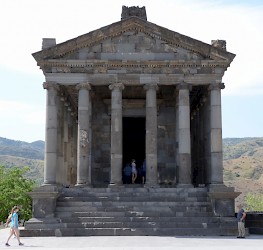Bacurius
Bacurius: Roman general of Iberian descent, killed in action in 394 CE.

Bacurius is mentioned several times in Roman sources. Ammianus Marcellinus mentions him as a tribune of the archers who fought without much success at the beginning of the Battle of Adrianople (378).
The archers and the targeteers, then under the command of one Bacurius of Iberia and Cassio, had rushed forward too eagerly in hot attack, and were already engaged with their adversaries; and as their charge had been untimely, so their retreat was cowardly; and thus they gave an unfavorable omen to the beginning of the battle.note
Ammianus identifies Bacurius as a man from Iberia, a small state to the north of Armenia. If the Byzantine historian Zosimus calls him an Armenian,note the error is understandable. “Bakur” is attested as a name in the Iberian royal dynasty in the chronicles of Georgia.
In the 380s, the church historian Rufinus met Bacurius in Jerusalem, where he served as dux Palaestinae, “military commander in Palestine”.note The two men were friends. Bacurius is also mentioned as a comes domesticorum, a member of the emperor’s military staff, of Theodosius (r.378-395).note In 388, Bacurius took part in Theodosius’ expedition against the usurper Magnus Maximus, who ruled in Gaul. Returning to the east, Bacurius appears to have resided in Antioch, where he became a friend of the famous orator Libanius.note

In 394, he took part in Theodosius' war against the supreme commander of the Roman forces in the west, Arbogast, and the emperor he had created, Eugenius. Together with Saulus and Gainas, Bacurius commanded the barbarian units.note He was present during the decisive battle at the river Frigidus, where he fought bravely.
Bacurius his principal officer, inspired with sudden and extraordinary ardor, rushed with his vanguard to the part where the barbarians were hardest pressed, broke through the ranks of the enemy, and put to flight those who a little before were themselves engaged in pursuit.note
He was killed in action.note
It is interesting to note that Libanius believed that Bacurius served the old gods while Rufinus was sure that he was a Christian. note Both men knew him personally; none of them had a reason to lie. It is likely that Bacurius was a courteous man who said the Lord’s Prayer when he shared a meal with a Christian family and sacrificed to the lares and penates when he visited a pagan house.
If this is true, Bacurius documents that Christianity had, three generations after the conversion of Constantine the Great, not yet developed into an exclusivist cult. It was still possible to be Christian and pagan at the same time. Similar ambiguous religious identities have been documented for Christianity and Judaism. The religious leaders may have had more exclusivist views and may have condemned "semi-Christianity", but many Romans preferred their own beliefs.